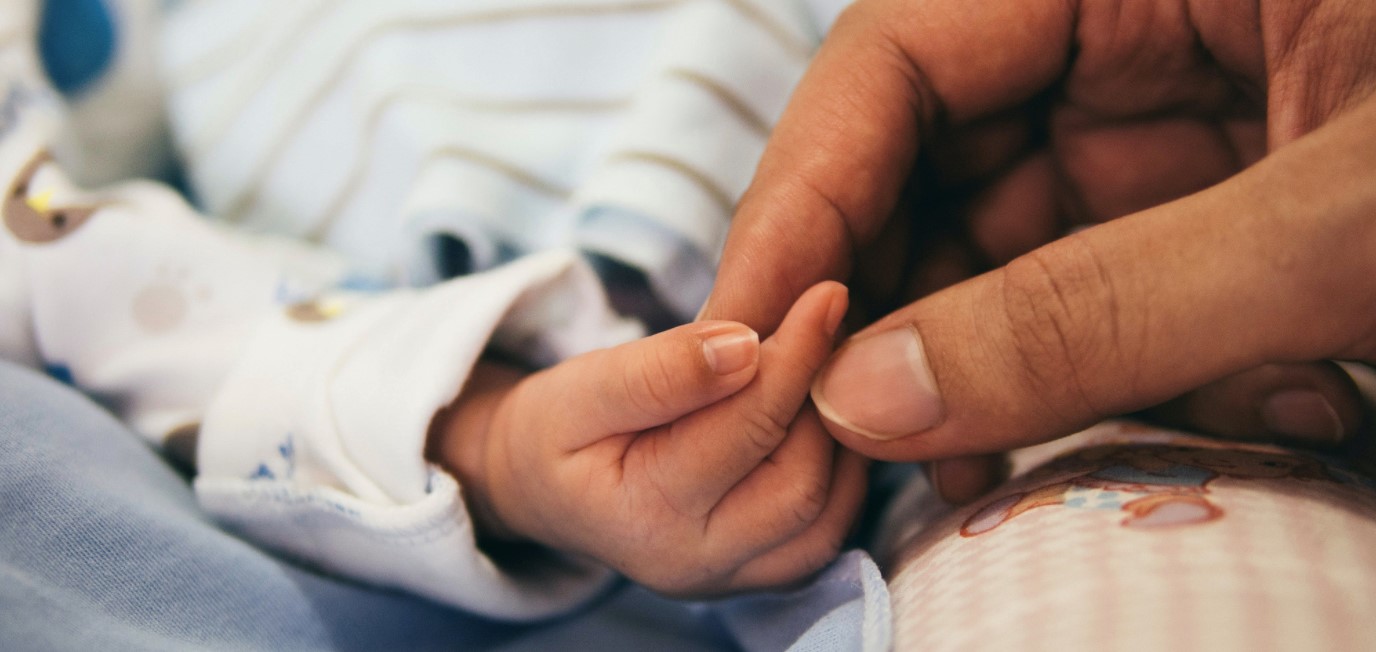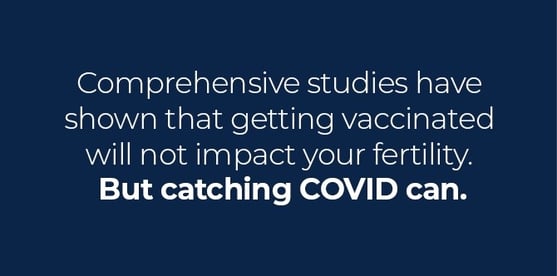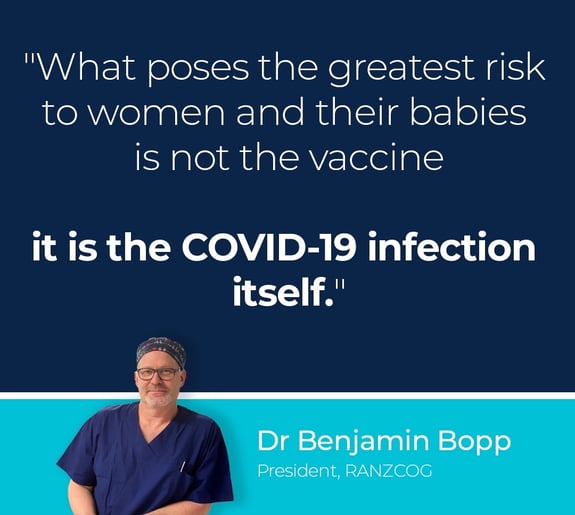mRNA vaccines vs catching COVID-19: looking at their impact on fertility and IVF.

There has been a huge amount of information (and misinformation!) circulating in relation to IVF, pregnancy and COVID-19. And it certainly can be confusing to know what is credible and what is not.
To help you stay informed, we have looked at the latest research in the hope of answering some of your most asked questions, and perhaps to help allay your fears.
COVID-19 vaccination
One of the questions we have been asked many times is whether the COVID-19 vaccination has an impact on fertility, or on pregnancy. This has been the subject of some comprehensive studies[1][2][3] that found that getting vaccinated will not impact your fertility but catching Covid can.
COVID-19 vaccination and IVF outcomes
Studies undertaken to date have found no impact or differences in IVF treatment and results in the IVF cycle following a patient's COVID-19 vaccination. Ovarian reserve and embryo variables were the same in the cycle following vaccination as they were in cycles prior to vaccination.
COVID-19 vaccination and male fertility
Another study focused specifically on whether the COVID-19 vaccination had any impact on sperm parameters. This study analysed semen taken from men 30 days after having received their second vaccination and compared those results to normal semen parameters within the World Health Organisation’s (WHO’s) reference ranges. This study found that there were no detrimental effects at all found in the semen taken from the fully COVID-19 vaccinated males that participated.
Covid vaccination during pregnancy
Published research[4] and real-world evidence from other countries have found that COVID-19 vaccines are safe for pregnant women. More than 200,000 pregnant women have been vaccinated in the US and UK with no adverse effects on the person, pregnancy or baby.
In fact, there is evidence that being vaccinated can offer protection to babies through passive immunity (ie, antibodies passing from the mother to the baby through cord blood and breastmilk).

What happens if I become COVID-19 positive?
Of course, none of us wants to be infected with COVID-19. Another study[5] looked at the potential impact of becoming infected with COVID-19 on a patient’s IVF cycle.
COVID-19 was not found to affect patients’ performance or ovarian reserve in their immediate IVF cycle after recovery, but it was found that there were a reduced number of top-quality embryos, compared to cycles of healthy patients who have never been exposed to the COVID-19 infection.
The most recent study on this topic in January 2022[3] found that there was no difference in conception rate in vaccinated couples compared to unvaccinated – but there was a slightly lower conception rate if the male had been infected with COVID-19 within 60 days of the woman’s menstrual cycle, suggesting that getting COVID-19 could temporarily reduce male fertility.
As a result of this study, we would recommend that patients postpone IVF treatment for at least two months after infection, to allow the patients to produce sperm and eggs that have not been exposed to COVID-19 infection during their development.
Please note that if you contract COVID-19 during an IVF cycle then currently it will have to be cancelled as day surgeries are unable to treat COVID-19 positive patients.
The impact of COVID-19 on pregnancy
Numerous studies have found that COVID-19 is more dangerous for women who are pregnant. If you are pregnant or were recently pregnant, you are more likely to get severely ill from COVID-19 compared to people who are not pregnant.[6] There is also an increased risk of pre-term birth and stillbirth. For all these reasons, we very strongly recommend that our patients are fully vaccinated before they attempt to become pregnant.
RANZCOG Advice
The peak body for obstetrics and gynaecology and women’s health has reiterated the importance of COVID-19 vaccines stating that mRNA vaccines for COVID-19 are recommended for all people trying to conceive (either spontaneously, or through IVF), pregnant, or breastfeeding. This advice is based on robust data supporting safety in these circumstances.
Specifically:
- There is no evidence of a negative impact on fertility
- There is no evidence of an increased risk of miscarriage, stillbirth, pre-term birth, or other adverse pregnancy outcomes
- There is no evidence of negative impacts on the health of the breastfed infant
- Conversely, infection with COVID-19 is associated with an increased risk of severe disease, hospitalisation, admission to intensive care, mechanical ventilation, and death, in pregnant women, and an increased risk of prematurity and stillbirth.

In conclusion
Studies have found no detrimental effects on IVF treatment, fertility, or pregnancy as a result of the COVID-19 vaccination, but actually contracting COVID-19 may require a postponement of IVF treatment or have serious health impacts on pregnant women and their babies. Our recommendation is for all our patients to pursue being fully vaccinated with both their first, second, and booster vaccinations for COVID-19 before or during IVF treatment with us.
In clinical trials released by both Pfizer and Moderna[7], it was found that the risk of getting COVID-19 was reduced by 90% after full vaccination compared to those who did not receive the vaccine.
Of course, Omicron is a relatively new variant of the virus, and although studies into this variant are in their preliminary stages, initial results seem to show that although vaccination effectiveness does seem to be reduced, having a third booster shot improves antibody activity against the virus, offering people their best chance to avoid being infected, or avoid being seriously unwell if infected.
As always, if you have any concerns or questions, please get in touch with us. We know this can be an anxious time for our patients, even without COVID-19 being thrown into the mix. We are here for you!
Sources:
[1] Does mRNA SARS-CoV-2 vaccine influence patients' performance during IVF-ET cycle? - https://pubmed.ncbi.nlm.nih.gov/33985514/
[2] Does mRNA SARS-CoV-2 vaccine detrimentally affect male fertility, as reflected by semen analysis? - https://pubmed.ncbi.nlm.nih.gov/34815157/
[3] A prospective cohort study of Covid-19 vaccination, SARS-CoV-2 infection, and fertility - https://academic.oup.com/aje/advance-article/doi/10.1093/aje/kwac011/6511811
[4] https://www.health.gov.au/news/joint-statement-between-ranzcog-and-atagi-about-covid-19-vaccination-for-pregnant-women
[5] Does COVID-19 infection influence patients' performance during IVF-ET cycle?: an observational study - https://pubmed.ncbi.nlm.nih.gov/33974475/
[6] https://www.cdc.gov/coronavirus/2019-ncov/science/science-briefs/underlying-evidence-table.html
https://ranzcog.edu.au/news/ranzcog-reiterates-advice-on-covid-19-vaccination